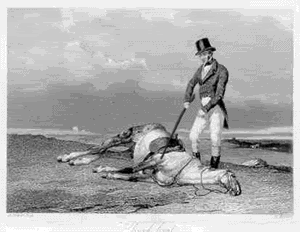by E. Marie Robertson
Society loves the "starving artist" myth, and we creatives are fed it from an early age. It infects us, and it infects the people who are potential buyers of our artwork. The poor struggling artist, painting feverishly in his or her sparse freezing garret, is a universal stereotype that is played out everywhere from classic literature to the nightly news. But there is some insidious doublespeak going on at the same time. Consider this: even while describing the desperate situation of "many artists" in a recent article about subsidized housing programs for creatives (one featured artist was, in fact, homeless), Bloomberg Business also heralded artists' "bankable cache."
So which is it? Are artists struggling, unappreciated, starving, broke? Or are artists "bankable"?
That. Is. Such. Bullshit.
I'm a sincere believer in the idea that we become the stories we tell ourselves. If you're trapped in the "struggling" cycle, breaking out might need to start in your head. Here are some important points to address to remove the labels and stop living the stereotype.
1. Watch Your Language. How do you describe yourself to others? What kinds of words do you use to characterize your life, your work, the lives and work of other artists? Stop painting yourself as struggling, starving, broke, unsuccessful, unappreciated, underpaid, etc. in your everyday conversations ... even the ones you have with yourself. You're only making that stereotype stronger, even if you're under the impression that you're just kidding when you say it. Language creates specific pathways in your brain that affect behavior. Don't create any more of the "wrong" ones.
Steps to take: First, just try to notice every time you use a derogatory or negative word or phrase in normal conversation about yourself, your work, your financial standing. Make a list of the ones that appear most often and the situations in which they come up. Now, create positive or nonjudgmental replacements for those negative turns of phrase so they don't come to define you over the long term. Make this a continual practice! You will be shocked by how automatic self-deprecation can be.
2. Explode Self-Limiting Beliefs. Many of us have swallowed whole the fallacy that poverty and struggle, especially for emerging artists, is some kind of litmus test to gauge how "good" or "serious" we are about our work. The next time you tell yourself you're broke because you are truly devoted to your craft and make "serious" art, think about whether or not Cindy Sherman, Ai Wei Wei, Gerhard Richter, Andreas Gursky or Chuck Close make "serious" artwork, or seem "devoted" to their craft. "Serious" is not the opposite of "saleable," nor is "real" the opposite of "successful."
Steps to take: Remove judgement from the equation. Make your work. If your response to the list above was "But that's them, that's not me. I'm no Chuck Close," ask yourself why not? If you're doing something you believe in, you are no different than them. If you find yourself feeling tinges of jealousy over other artists' success, transform that emotion into confirmation that artists CAN be successful, and that includes you.
3. Kick Your Fears to the Curb. Do you have specific fears connected to success and prosperity? This can be linked to #3 ("If my artwork is popular, it can't be very good."), or can be much more personal ("If I succeed as an artist it will mean my mother, who always told me I would never make any money as an artist, would be wrong and I can't make mom wrong."). You might even be worried that if you make "too much" money, you'll draw the negative attention of the IRS or have to set boundaries with a deadbeat relative who is always asking everyone for financial help. It doesn't matter if the fears are large or small, totally illogical or highly likely. It's our most powerful motivator, and can keep you trapped in a very tight space for a lifetime.
Steps to take: Make a long exhaustive list of everything that worries you about potential success and prosperity. Include everything you can think of, no matter how tangential or silly it seems. Now go through that list and carefully, realistically consider the likelihood of that fear coming to pass ... and what it would mean and what you would do about it. Understanding your fears in context enables you to address them so they no longer have power over you.
4. Begin Evaluating Where You Need Help ... and Get It. What's holding you back? Money blocks? Creative issues? Deep psychological conditioning around success and failure? No understanding of how to sell your art or promote yourself? There are coaches on top of coaches available to work with you, and many of them offer very solid free introductory courses or training sessions online. You'll also find many of these concerns addressed in best-selling books and online vehicles like TED Talks and blogs. Depending on where you live, you may also find some great options locally, like artists' guilds and collaboratives, small business advisors, or other community college or Learning Annex courses to help you approach your practice like the successful positive experience it should be.
Additional Resources:
Oldham, Jennifer. "Dream Apartments for $582 a Month -- If You're a Starving Artist." Bloomberg.com. Bloomberg, 20 Nov. 2015. Web. 10 Feb. 2016. <http://www.bloomberg.com/news/articles/2015-11-20/dream-apartments-for-582-a-month-if-you-re-a-starving-artist>.
Zaidi, Nida. "Top 10 Richest Painters of 2015." Smart Earning Methods. N.p., 22 Oct. 2014. Web. <http://www.smartearningmethods.com/top-10-richest-painters-world-2015/>.
Coming up next week on ArtLifeNow: Breaking Through Creative Blocks

No comments:
Post a Comment